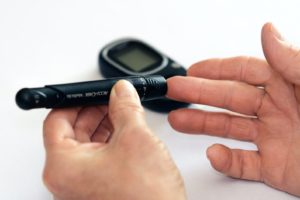 500,000 people every year are choosing dental implants to replace their missing teeth. As the only method to recreate both the roots and the crowns, they are the next best thing to your real teeth. Most people with good oral and general health are candidates for dental implants, but what if you have pre-existing conditions, like diabetes? Even diabetics can benefit from dental implants, but there are a few things you should know.
500,000 people every year are choosing dental implants to replace their missing teeth. As the only method to recreate both the roots and the crowns, they are the next best thing to your real teeth. Most people with good oral and general health are candidates for dental implants, but what if you have pre-existing conditions, like diabetes? Even diabetics can benefit from dental implants, but there are a few things you should know.
Diabetes May Increase Your Risk of Failure
Dental implants have a very high success rate. Generally, the risk of failure is less than 5%. However, people with Type 1 and Type 2 diabetes might take longer to heal and have a greater risk of infections. Poor osseointegration or infections can cause your dental implants to fail, but your dentist can minimize the likelihood of complications.
People with controlled diabetes can be candidates for dental implants. Your dentist will review your medical history to look for anything concerning. They may take precautions to ensure nothing slows healing and to prevent infections. With a personalized treatment plan, your investment can thrive for decades.
Dental Implant Success Rate for Diabetics
With the right precautions and aftercare, implant survival in diabetics is 96.4%. You can ensure nothing compromises your new smile by caring for your dental implants properly. The biggest threat to their longevity is an infection called peri-implantitis.
Since diabetics are more prone to infections, a solid oral hygiene routine is crucial to safeguarding your new smile. You can keep infection at bay by:
- Brushing Twice Daily: Use a soft-bristled toothbrush and nonabrasive toothpaste to brush your teeth for 2 minutes at least twice per day, if not after every meal.
- Floss Daily: Flossing between each tooth and around your abutments will remove bacteria-harboring plaque. A waterflosser can be easier to use than traditional floss, cleaning the most difficult-to-reach places using a pressurized water stream.
- Use a Mouthwash: Use an antimicrobial mouthwash daily to kill any bacteria left behind by brushing and flossing.
- Don’t Smoke or Drink Alcohol: Smoking and drinking a lot of alcohol increases your risk of infections, which are also more difficult to treat.
- Manage Your Diabetes: Follow your healthcare provider’s instructions to keep your diabetes under control.
- Visit Your Dentist: Visit your dentist every 6 months for a cleaning and checkup. Don’t wait until your next appointment if you develop any concerning symptoms between visits, like redness or pain near the implant.
A complete smile is possible using the most reliable solution for tooth loss, even if you have diabetes. Your dentist will create the individualized strategy you need to ensure your safety and the success of your new smile.
About Dr. Shue Her
Dr. Her earned his dental degree at the University of Minnesota School of Dentistry and has regularly continued his education in advanced services, like periodontal therapy, dental implants, and sedation dentistry. He has the qualifications and a reputation you can trust. Request your consultation through our website or call (470) 228-4977 to schedule an appointment.
